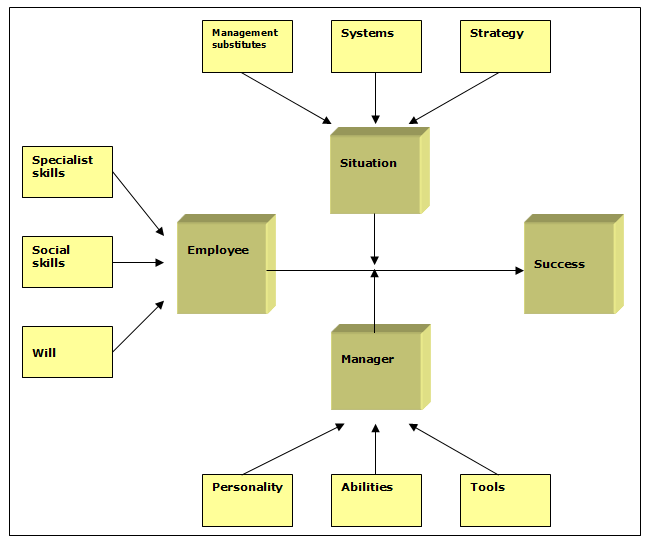Developed by Ulrich Grannemann
Factors affecting employees’ performance
Is the manager becoming more or less important for the success of the company?
The manager is not the only producer of effects which influence the success of employees.
Below you will find a system of factors which affect employees’ performance, along with a prognosis.
Three influencing factors
In principle, the factors affecting the success of the employee’s performance can be divided into three broad categories:
|
1. The employee:
|
with all their knowledge and abilities, experience, motivation, professional and social skills,
|
|
2. The situation:
|
with all its management substitutes, such as request, monitoring and feedback systems and the company’s position relative to the competition,
|
|
3. The manager:
|
with their personality, management skills and tools, management behaviour and actions.
|
Overview of causes

Influence of the Factors
How large the influence of these factors is depends above all on the measurability and the rate of repetition of the actions performed.
The manager is even more important if he cannot be replaced by management substitutes or management systems.
This means that the less objectively measurable the performance is and the faster the conditions for the production of performance change, the more important managers become.
|
What are management substitutes?
The management situation is pre-structured
The work situation is more or less pre-structured for the employees. Work generally continues even without management. Examples of workplaces which are heavily pre-structured include production lines, call centres, supermarket checkouts etc. The employees can be given relatively little training and can thus be replaced quickly. Management often means managing exceptions and deviations. Feedback is given automatically.
Management as a co-producer of effects
Are we as managers the only significant controller in organisational value creation? Of course not. We are not the only producer of effects (Leading and being led, Oswald Neuberger, UTB 2002). Alongside finance, production conditions, payment and monitoring systems and many more, the management is a co-producer of effects, the “residual control”. Since management always stands alongside other factors, however, its contribution always remains unclear and disputed.
|
The significance in terms of the employees sinks, however, the more independently they can assess and adapt their performance. This can take further work from the management.